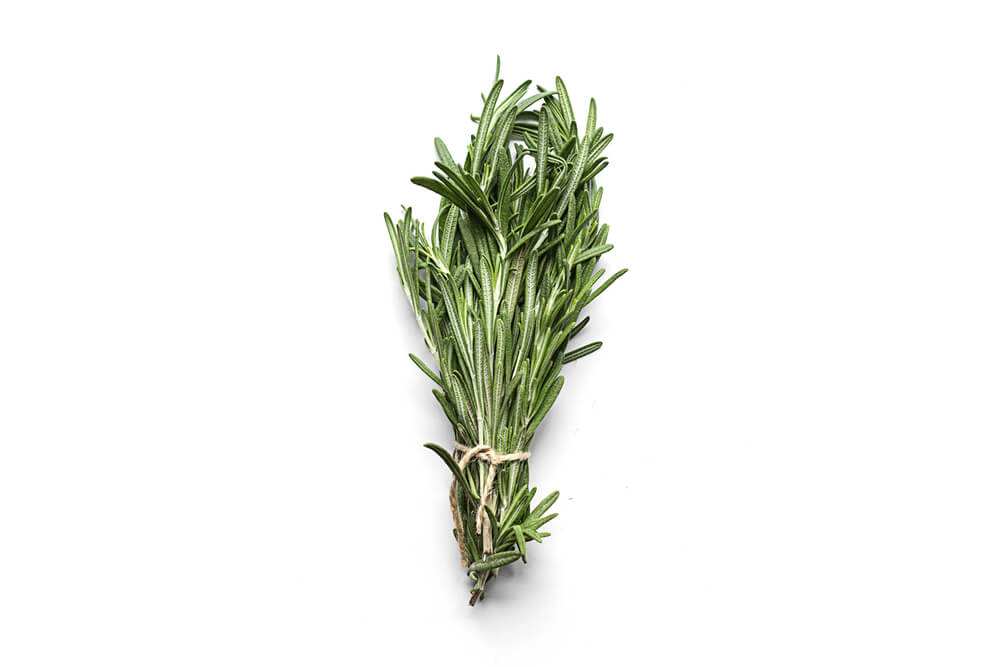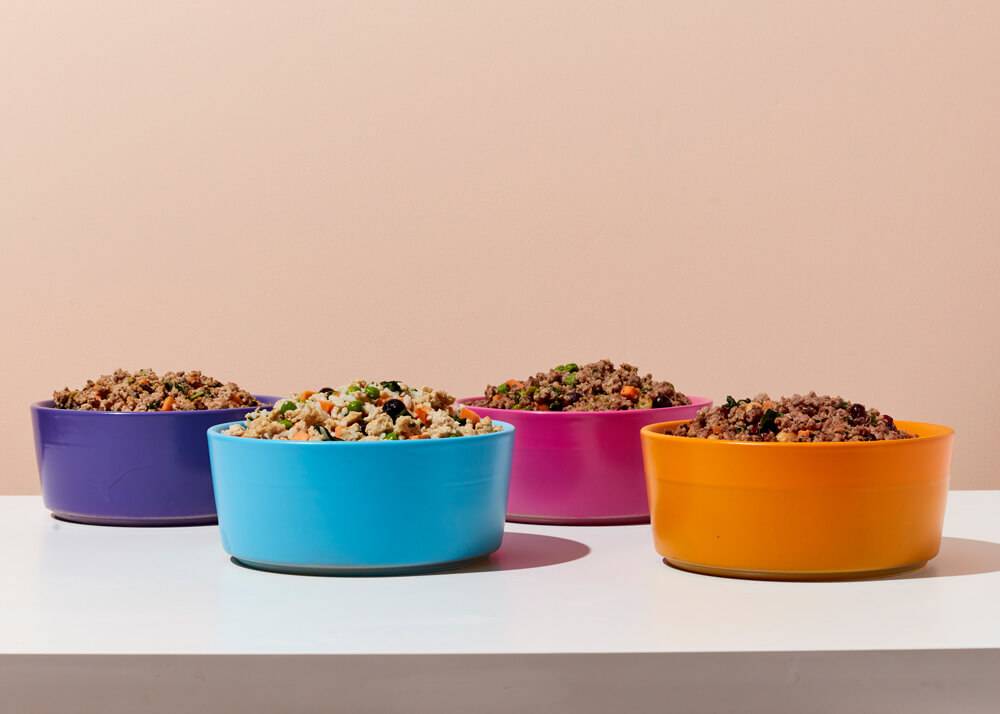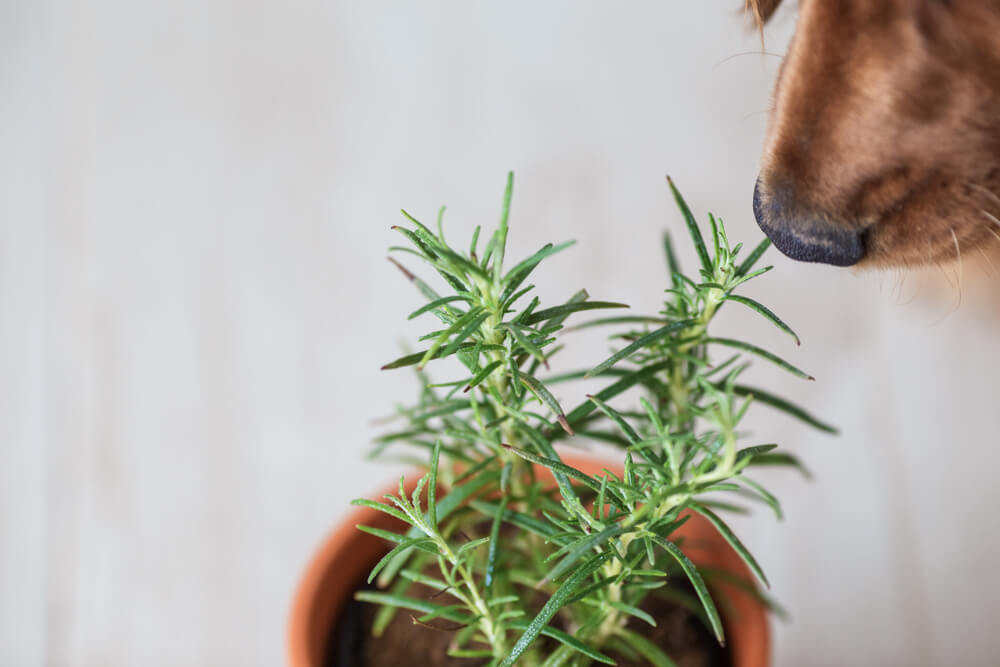Hey Ollie blog readers! We’re offering you an exclusive 60% OFF your starter box! Try now!
The fresh, pine-like scent of rosemary can remind you of holiday dinners or backyard herb gardens. Many people love using rosemary to season chicken, turkey, or even baked dog treats. But can dogs have rosemary safely?
Good news: rosemary is not toxic for dogs and is generally safe in small amounts. In fact, it’s sometimes added to high-quality dog foods as a natural preservative or flavor boost. But like any herb, rosemary isn’t risk-free — too much can upset your dog’s stomach or cause irritation.
In this guide, we’ll explain whether rosemary is safe for dogs to eat, the potential health benefits, how much is safe, and when you should skip it altogether.
Can Dogs Eat Rosemary?
Yes, dogs can eat rosemary in small amounts, and it’s generally considered safe. In fact, rosemary is sometimes added to natural dog foods and treats as a preservative or flavor enhancer. It’s rich in antioxidants and has antibacterial properties, which can help support your dog’s overall health.
Fresh or dried rosemary leaves can be sprinkled lightly onto your dog’s food, but a little goes a long way. Too much rosemary might cause an upset stomach, especially in smaller dogs. Avoid giving your dog rosemary essential oil or concentrated extracts, as those can be too strong and may lead to side effects like vomiting or difficulty breathing.
For healthy dogs, rosemary can be a safe herb to include occasionally as part of a balanced diet. But if your pup has a history of seizures or is on medication, it’s best to check with your vet before adding herbs like rosemary to their meals.
Is Rosemary Safe For Dogs?
Yes, rosemary is generally safe for dogs when used in small amounts. This fragrant herb isn’t toxic to dogs and is even used in some high-quality dog foods and treats as a natural way to add flavor or act as a mild preservative.
Rosemary contains antioxidants and has natural antimicrobial properties, which is why some pet food makers add a dash of it to help keep food fresh. A tiny sprinkle of fresh or dried rosemary on your dog’s food is usually fine, as long as your pup doesn’t mind the strong smell or taste.
But just because rosemary is safe doesn’t mean more is better. Eating too much rosemary can cause stomach upset, vomiting, or diarrhea. In rare cases, large amounts of rosemary might even irritate a dog’s mouth or lead to mild nervous system effects, but that’s very unlikely if you’re just using a pinch here and there.
If your dog has a sensitive stomach, always test with a tiny amount first to see how they react. And steer clear of concentrated rosemary oils or extracts, those are much stronger than the herb itself and can be risky if swallowed or spread on your dog’s skin.Quick tip: When in doubt, keep rosemary as a garnish, not a main ingredient. For most dogs, there are safer, easier ways to add tasty herbs or natural flavor to meals.
Is rosemary good for my dog?
Yes! “Rosemary, in most forms (dried, fresh whole plant, tincture or tea) can be used very safely in dogs, and is Generally Regarded as Safe (GRAS) by FDA for use in both humans and animals,” says herbalist Gregory L. Tilford, co-author of Herbs for Pets. While GRAS doesn’t necessarily imply that it is beneficial, there are numerous health benefits to giving rosemary to your dog.
Health benefits of rosemary
Antioxidants
Rosemary packs a powerful antioxidant punch. This means that it can help eliminate free radicals in your dog’s body. An excess of free radicals is what can lead to cancer or other age-related health issues. Incorporating some rosemary in your dog’s diet can help keep him healthy.
Cardiovascular health
Another benefit of feeding rosemary is that it has antispasmodic (spasm preventing) abilities on smooth muscles. Additionally, it can help in the case of some cardiac arrhythmias as well as to strengthen the heart. If your dog has cardiac issues, consult your vet before adding rosemary to your dog’s diet or treatment plan.
Digestion support
Rosemary can help your dog digest food better, which can lead to a healthier gut and better absorption of micronutrients. It helps prevent gastrointestinal infection and can even help prevent gas. If your dog is routinely clearing rooms with stinky gas, rosemary might be the solution you’re looking for.
Antimicrobial
There’s good reason rosemary is a popular dog food preservative. Rosemary, as it turns out, is a great pathogen-fighter against common bacteria that can grow in food. It can help keep food from spoiling. Not only that, the pathogen-fighting capabilities of rosemary extend to your pet’s body, where it can protect them from various fungi and bacteria. Because of rosemary’s antimicrobial power, it can also be used topically. You may find it as a key ingredient in skin and eye rinses. Rosemary is helpful in the treatment of minor cuts, skin burns, oral, urinary and digestive tract infections.

How much rosemary do I give my dog?
The answer to this question will depend on a lot of things. You’ll want to consider the size and weight of your dog as well as why you are giving the rosemary to your pet. You can use fresh or dried rosemary or purchase a tincture. A tincture is a liquid form of the herb. It can be more concentrated than the fresh or dried rosemary so make sure you understand the correct dosage before giving a tincture to your dog.
Rosemary in Ollie’s fresh dog food

Scanning the ingredients lists of Ollie’s fresh recipes, you’ll see rosemary make an appearance on both the Beef and Chicken recipes. Ollie uses rosemary not only for the incredible health benefits mentioned, but also as a flavor saver that makes the food more flavorful and palatable to pups. Serving your Ollie is the best way to ensure you’re feeding the right amount of nutrients and avoid overfeeding. Try Ollie today.
Learn more about the benefits of a fresh, natural diet for dogs.
Rosemary crackers recipe
(courtesy of dogster.com)
This recipe for rosemary crackers is another easy way to safely introduce the herb into your pup’s diet. You can even enjoy this snack along side them!
Ingredients:
- 1 ¼ cup white flour
- ¼ cup whole wheat flour
- 1 teaspoon baking powder
- 1 tablespoon rosemary chopped (fresh or dry)
- ½ cup water
- 1/3 cup olive oil + 2 tablespoon
- Salt (for humans only)
Directions:
- Preheat oven to 450 degrees Fahrenheit.
- Mix flours, baking powder and rosemary in a bowl.
- Stir in water and oil until combined, reserving the extra 2 tablespoons of oil. You may need to get in there with your hands. If it feels too dry, add a tiny bit of water at a time until it has a damp, but not sticky, texture. If it’s too sticky, slowly add white flour until it feels right.
- Split into two balls and roll each one out about 1/8 inch thick.Place on a baking parchment sheet, and sprinkle with the remaining olive oil.
- Sprinkle a little salt on the human portion if desired.
- Bake for about 10 to 12 minutes or until crackers brown on the edges.
- Allow to cool, then break into pieces for treats and snacking.
When using rosemary as a dietary supplement you should still consult your vet first if you have any questions or concerns about how much to give.
NOTE: If your dog has a serious heart condition, history of seizures is under 6 months old, or pregnant you may not want to use rosemary. You will want to make sure you consult a vet or holistic practitioner first.
Different Forms of Rosemary: What’s Safe for Dogs?
Rosemary comes in a few different forms, fresh leaves, dried herbs, essential oils, and extracts, and not all of them are safe for your dog in the same way.
Fresh or dried rosemary leaves:
These are the safest for dogs when used in moderation. A sprinkle of chopped fresh rosemary or a pinch of dried rosemary can add flavor and a boost of antioxidants to your dog’s meal. Just make sure it’s plain, no added garlic, salt, or seasoning blends.
Rosemary essential oil:
Be extra cautious here. Rosemary essential oil is much more concentrated than the leaves or dried herb. While it’s sometimes used in natural flea sprays or shampoos, dogs should never lick or eat rosemary oil directly. Swallowing concentrated oils can cause vomiting, diarrhea, or even more serious nervous system symptoms. If you use rosemary oil on your dog’s coat, make sure it’s well-diluted and vet-approved.
Rosemary extract:
You might see rosemary extract listed as an ingredient in some high-quality dog foods. This is safe in tiny amounts, it acts as a natural preservative to keep fats from spoiling. You don’t need to add rosemary extract yourself at home; the small amount in food is enough.
Avoid rosemary-infused products not made for pets:
Skip rosemary in marinades, seasoned leftovers, or herbal blends meant for humans. These often contain other ingredients like onions, garlic, or spices that are dangerous for dogs.
Bottom line: Fresh or dried rosemary is generally safe for most dogs in small doses. Essential oils or concentrated extracts should only be used under a vet’s guidance. When in doubt, stick to a light sprinkle of fresh rosemary and skip anything too strong or heavily processed.
Frequently Asked Questions Rosemary For Dogs
Can dogs have rosemary leaves?
Yes, plain fresh or dried rosemary leaves are generally safe for dogs in small amounts. Just make sure they’re clean and free from added seasonings like garlic or salt.
Is rosemary essential oil safe for dogs?
Use caution with rosemary essential oil. It’s much stronger than the fresh herb and can be toxic if your dog licks or eats it. Never apply undiluted rosemary oil to your dog’s skin without your vet’s advice.
Is rosemary good for dogs’ health?
In moderation, rosemary can provide antioxidants and may help support healthy digestion. Some dog foods use rosemary as a natural preservative. But your dog doesn’t need rosemary to stay healthy, balanced fresh food does that best.
Can dogs eat rosemary in cooked food?
Yes, if you’re cooking plain chicken or turkey with a small amount of rosemary, that’s fine for most dogs. Avoid recipes with garlic, onions, heavy salt, or butter, which can be harmful.
How much rosemary is safe for dogs?
A tiny sprinkle, think a pinch mixed into your dog’s regular food, is plenty. Too much rosemary can upset your dog’s stomach and cause vomiting or diarrhea.
What should I do if my dog eats a lot of rosemary?
A few extra leaves won’t usually hurt, but if your dog eats a large amount, or gets into rosemary oil or a concentrated product, call your vet. Watch for signs like drooling, stomach upset, or unusual behavior.
The Ollie blog is devoted to helping pet parents lead healthier lives with their pups. If you want to learn more about our fresh, human-grade food, check out MyOllie.com.
Tagged As:

The nutrition your dog needs,
the food they want.

Enjoying our articles? Subscribe our Newsletters and get new articles directly to your inbox
You might also like
17 October 2025
6 MINS READ
Choosing the Best Food to Fuel Your Puppy’s Strong Future
As a new pup parent, you have the responsibility of laying the foundation for your puppy’s future health. The nutritional choices you make during their first year are crucial, directly influenci…
by Ollie Pets
17 October 2025
3 MINS READ
Gentle Human-Grade Solutions for Sensitive Stomachs
Watching your dog suffer from a sensitive stomach is always stressful, and the constant worry about gas, loose stools, or vomiting can be overwhelming. Fortunately, a high-quality, easily digestib…
by Ollie Pets
17 October 2025
5 MINS READ
Choose Fresh: The Best Dog Food for Allergy Relief
As a pup parent, there’s nothing worse than seeing your dog in distress. The constant scratching, irritated skin, or upset stomach that comes with allergies can be heartbreaking. The good news is …
by Ollie Pets







